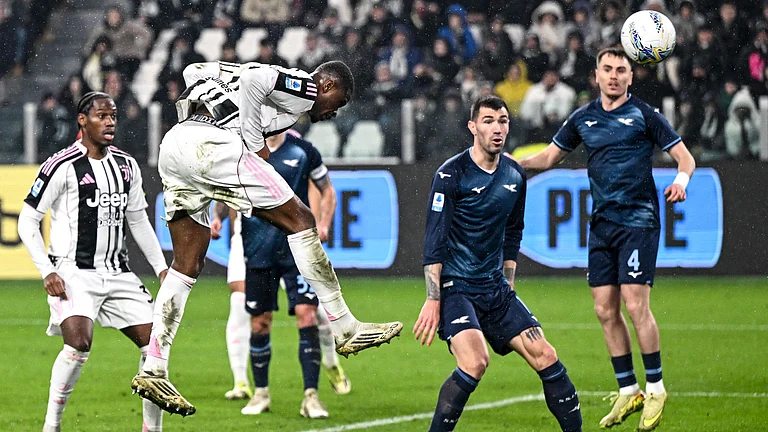THE troubles of Manohar Rajaram (Manu) Chhabria are far from over. Despite the fact that the revolt of his managing director, Murli Dhar Shukla, proved a damp squib, the Dunlop chairman remains holed up in Dubai to avoid being interrogated by the Enforcement Directorate (ED) about shady financial dealings in his other company, Shaw Wallace. And in the meantime, Dunlops union representatives have gone to West Bengal Chief Minister Jyoti Basu who assured them he would speak to Finance Minister P. Chidambaram to see what can be done to put the beleaguered Rs 800-crore tyre pioneer back on the rails.
The management revolt in Dunlop was reportedly triggered by Chhabrias misbehaviour and his threat to dismiss three top executives: S. Badrinathan, Amit Mondal and Anju Madeka. The three were summoned to Dubai and reportedly hauled over the coals for not having drawn up an agenda for the meeting. On their return to India, the executives were given a warm welcome by managers and workers which culminated in a declaration by Shukla that a non-executive chairman sitting in Dubai had no right to dismiss senior executives.
The situation was aggravated with the induction of Chhabrias daughter, Komal Chhabria Wazir, on the Dunlop board as his alternate director. Shukla saw this as a move by the absentee chairman to erode his authority. He blamed Chhabrias tarnished image for Dunlops credit crunch and the erosion of suppliers confidence.
Chhabrias reaction was swift and lethal. He told reporters in Dubai that Shukla was trying to mislead Dunlop employees and shareholders to avoid awkward questions about financial mismanagement of the company. He underscored that with 44 per cent of the equity, he was the single largest shareholder and the managing director had no right to challenge his authority. He also questioned the Rs 21-crore unaudited half-yearly profit Dunlop declared, thereby pointing an accusing finger at Shukla the only executive director on the Dunlop board and Madeka. Shortly after this missile from Dubai, Shukla meekly submitted his resignation, followed by Madeka.
P.J. Rao, executive director of Shaw Wallace, and T.S. Shettigar, finance director of Dubai-based Jumbo International Holdings, have been inducted as additional directors, and they along with Komal Chhabria have been entrusted to run the company. The new management has indicated it may ask the government for a special audit of the companys finances.
Booting out managers is not new to Chhabria. Between 1988 and 1994, four Dunlop managing directors have passed through the exit door. Shukla lasted just over two years as managing director. But what is puzzling is why he surrendered so abjectly, letting down those who had rallied to his banner, risking their jobs. According to the corporate grapevine, Chhabria knew of skeletons in Shuklas cupboard, both corporate and personal, which he threatened to expose unless Shukla threw in the towel. If, for instance, the special audit reveals that Dunlops accounts were fudged, Shukla and Madeka will have to take the rap as Chhabria can disclaim any knowledge of it.
Another grouse of the previous Dunlop management is that the RBI has applied the Group Concept against Chhabria-controlled companies and this severely restricts Dunlops eligibility for long-term and short-term loans. They see no reason why Dunlop and its small shareholders should suffer for the fact that Chhabria is in the RBIs bad books for the unpaid debts of Orson Electronics and for the sins of the Shaw Wallace management.
Because of the Group Concept, Dunlop has its working capital pegged at a very low Rs 38 crore. Company sources say this has blocked a number of profitable projects and replacement of critical machinery. The irony is that the financial institutions (FIs) are hurting themselves, as they are Dunlops second-largest shareholders with 34 per cent of the equity.
DESPITE this sizable holding which entitles them to have at least two directors, the FIs are unre p resented on the Dunlop board. This is particularly baffling as the corporate world has been rocked for some time now by allegations that the Shaw Wallace management has been siphoning off large funds. If the Ministry of Finance has doubts about the business ethics of the Chhabria companies, it is surprising that it hasnt insisted on inducting FI nominees on the Dunlop board to ensure a strict watch on financial and other malpractices.
Crushing the Shukla revolt could compound Chhabrias problems as a section of Dunlop employees and workers may petition the Company Law Board (CLB) to instal government nominees on the board.
Chhabrias real problem is with the once cash-rich Shaw Wallace which he controls with about 40 per cent equity. Here 26 per cent of the equity is held by FIs, but unlike Dunlop there is an FI nominee on the Shaw Wallace board. However, this nominee has for unknown reasons remained a mere spectator while the scam has been unfolding a total departure from the activist role of the FIs in the ITC-BAT confrontation. A section of shareholders has complained to the CLB that Chhabria and his executives have siphoned off about Rs 200 crore raised by Shaw Wallace through inter-corporate deposits. The ED has instituted a probe and a number of former and current Shaw Wallace directors have been repeatedly grilled. P.L. Narasimhan, former finance director, was arrested and kept in custody for questioning.
According to ED sources, nearly all those questioned, including Narasimhan, have confessed that they acted on Chhabrias instructions. But Chhabria, although summoned by the ED for questioning, has refused to come to India on grounds of being an NRI. So far there has been no move to force him to return to India to face questioning and possible arrest.
Chhabrias prolonged absence from the country, however, is causing problems. The fact that he has installed his daughter as vice-president of Shaw Wallace and director in Dunlop is clear indication that he feels he can no longer trust his senior managers from afar.


























